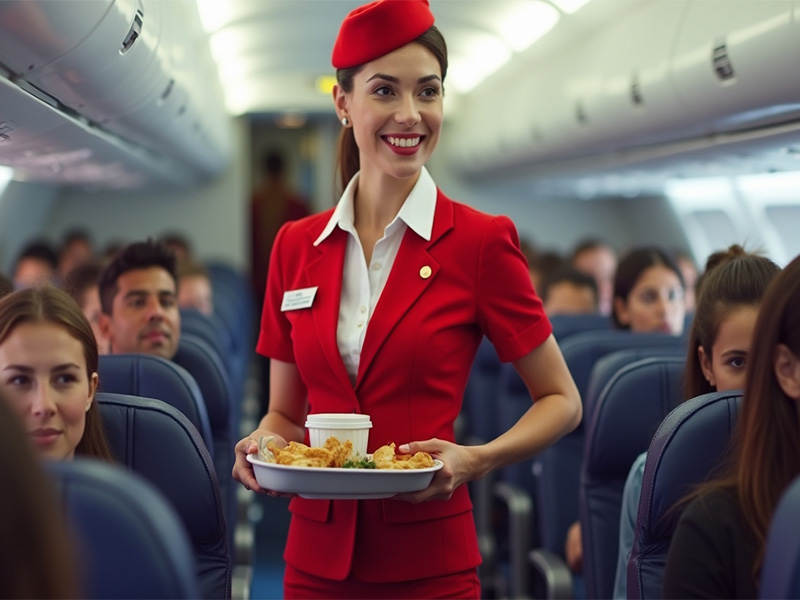
وبلاگ سپهران | Airlines | How to Become a Flight Attendant?
Being a flight attendant is one of the most exciting and appealing careers in the aviation industry, attracting many individuals from around the world. Traveling to different countries, experiencing diverse cultures, and interacting daily with passengers are just a few of the unique aspects of this profession. However, becoming a professional flight attendant takes more than just passion. It requires specific skills, personality traits, and formal training. In this article, we will explore the steps and qualifications needed to become a successful flight attendant.
A flight attendant plays a crucial role onboard, focusing on passenger safety, in-flight care, and creating a secure, comfortable environment throughout the journey. These professionals are not only responsible for in-flight services, such as serving food and beverages, but they are also trained to handle emergencies swiftly and effectively. Flight attendants must maintain a professional demeanor, exhibit polite behavior, and display a high level of patience as they deal with a diverse range of passengers and situations. Their role is essential in creating a pleasant and safe travel experience for everyone on board.
No, a degree in engineering or any specific academic field is not required to pursue a career as a flight attendant. You don’t need a bachelor’s, master’s, or even a specialized university degree. Instead, aspiring flight attendants must complete certified training programs and pass both theoretical and practical examinations offered by institutions authorized by their national aviation authority.
Yes, height is not a disqualifying factor for entering flight attendant training programs. Whether you’re above average height (e.g., over 170 cm) or not, you can enroll in cabin crew courses and earn the required certification. However, airline hiring criteria may vary — some carriers may have height preferences based on aircraft type or safety equipment access. Therefore, it’s best to consult the specific recruitment standards outlined in each airline’s job postings.
There are many misconceptions about the duties of a flight attendant. Some people think it’s all about smiling, chatting with passengers, and serving food. In reality, flight attendants hold a critical safety role and must be taken seriously by all passengers during the flight. Any failure to follow cabin crew instructions can result in legal consequences at the destination airport.
Flight attendants do not provide technical support for personal electronics such as smartphones or laptops. Their job is centered on passenger safety, comfort, and compliance with aviation regulations.
While no university degree is mandatory, having a background in psychology, customer service, or foreign languages can give candidates an advantage. Airlines value individuals who are emotionally intelligent, multilingual, and adept at handling a wide range of personalities.
Here are the qualities and skills that increase your chances of excelling as a flight attendant:
If you hold a high school diploma — regardless of your focus (math, humanities, sciences, or vocational) — you can still pursue a flight attendant career by enrolling in approved training programs and passing required exams. Those with language certifications or nursing backgrounds often enjoy higher acceptance rates due to their transferable skills.
Several aviation academies and private training centers offer flight attendant courses that issue industry-recognized certificates. Graduates of these programs are eligible to apply for cabin crew positions during airline recruitment periods.
Several accredited training centers, such as flysepehran, offer professional flight attendant courses. Anyone aspiring to join this career must first complete one of these certified programs. After earning their certification, candidates can begin submitting their résumés to various airlines when job openings are announced.
The qualification test is usually held in English, as it reflects the international standards of the aviation industry. Airlines often have a multi-step recruitment process, which includes both written assessments and in-person interviews. Successful applicants must also pass a medical examination before officially entering the profession.
Keep in mind: individuals with certain health conditions—such as diabetes, high cholesterol, epilepsy, or similar chronic illnesses—are often disqualified during the medical evaluation. Additionally, this health screening is repeated annually for all active flight attendants. Those who wear prescription glasses may also face reduced chances during the selection process.
The appeal of being a flight attendant varies greatly from person to person. Some value the job for its high social prestige, while others are drawn to the opportunity to travel extensively, visiting destinations across Iran and even worldwide. In essence, the role offers both professional recognition and the chance to experience diverse cultures, which makes it uniquely rewarding.
Yes, having a good command of the English language is crucial for anyone aiming to become a flight attendant. However, fluency is not a strict requirement at the entry level. Most training centers include English language classes as part of the program to help students improve their communication skills.
Since the entrance exams are administered in English, basic comprehension is needed from the start. Beyond that, flight attendants must be able to interact effectively with international passengers during flights and also deliver announcements in both Persian and English. Strong language skills not only boost your chances of employment but are also indispensable for success in this global-facing profession.

Becoming a flight attendant does not require a university degree in engineering or any specific academic field. Instead, candidates must complete specialized training at approved aviation institutes and pass both theoretical and practical exams, usually conducted in English. After training, aspiring attendants can apply to airlines, undergo multi-stage interviews, and pass a medical examination. Fluency in English is highly important, as the job involves interacting with international passengers and making bilingual announcements. The role requires emotional intelligence, physical fitness, teamwork, and a strong sense of responsibility. For many, the greatest perks of the job include high social prestige and the opportunity to travel widely, making flight attending a uniquely appealing and dynamic career.